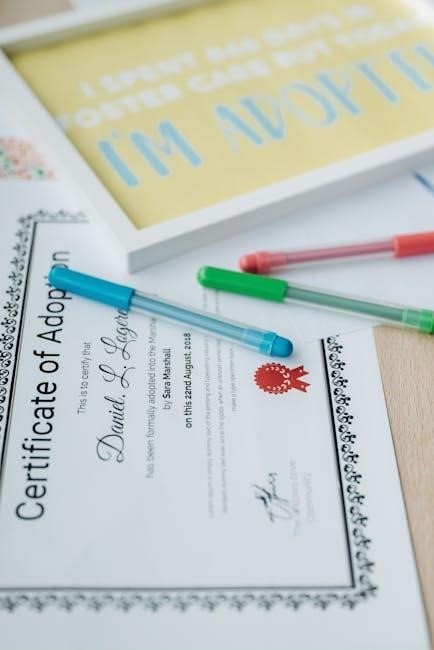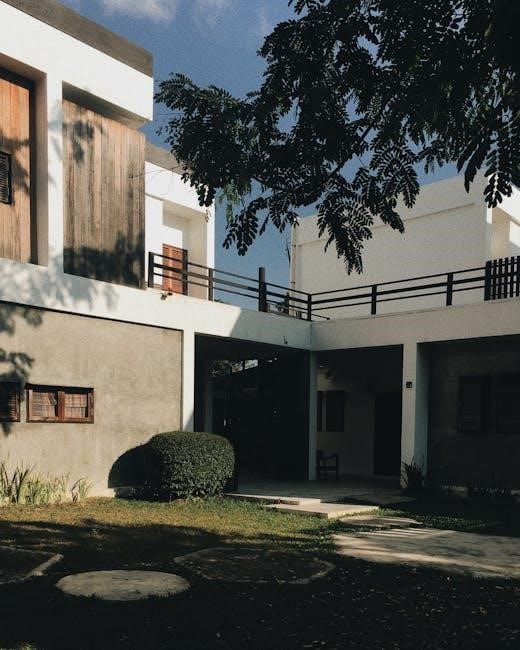A Residence Certificate in Thailand is an official document issued by local authorities, confirming an individual’s legal residence in the country. It is essential for various legal procedures, including visa extensions, property purchases, and employment verification. Foreign nationals must obtain this certificate to validate their stay and access essential services. The certificate is typically required for long-term residents and is issued after verifying the applicant’s address and legal status in Thailand.
1.1 Importance of a Residence Certificate
A Residence Certificate is essential for verifying an individual’s legal stay in Thailand, ensuring compliance with immigration laws. It is required for various official processes, such as renewing visas, registering businesses, or purchasing property. The certificate validates one’s address and residency status, aiding authorities in maintaining accurate population records. Additionally, it serves as proof of residency for accessing public services, opening bank accounts, or obtaining a Thai driver’s license; Without it, foreigners may face restrictions in conducting legal transactions or accessing essential services. Therefore, securing a Residence Certificate is a critical step for anyone planning to live or work in Thailand long-term.
1.2 Eligibility Criteria for Applicants
To apply for a Residence Certificate in Thailand, applicants must meet specific eligibility criteria. Foreign nationals residing in Thailand are eligible if they hold a valid visa or legal residency status. Applicants must provide proof of their address in Thailand, such as a rental agreement or ownership documents. They must also demonstrate a legitimate reason for requiring the certificate, such as employment, education, or marriage to a Thai citizen. The certificate is typically issued to individuals who have been residing in Thailand for an extended period and can provide documentation supporting their legal stay. Eligibility may vary based on individual circumstances and local authority requirements.
Understanding the Application Process
The application process for a Residence Certificate in Thailand involves submitting required documents and following a structured procedure. Applicants must complete the form accurately and provide necessary proofs to ensure approval.
2.1 Step-by-Step Guide to Filling the Form
To fill the Residence Certificate Application Form in Thailand, start by downloading the form from official sources or obtaining it from the local district office. Carefully read the instructions and fill in all required personal details, such as your full name, passport number, and address in Thailand. Ensure all information is accurate and matches your supporting documents. Attach a recent passport-sized photo and sign the form as required. Double-check for any errors before submission. Gather all necessary documents, including photocopies of your passport, visa, and proof of address, to avoid delays. Submit the completed form and documents to the designated authorities during their operating hours.
2.2 Required Documents for Submission
When applying for a Residence Certificate in Thailand, you must submit specific documents to support your application. A valid passport with a current visa stamp is essential, along with a photocopy of the passport’s main pages. Proof of address, such as a rental agreement or utility bills in your name, is also required. Additional documents may include a completed application form, a recent passport-sized photo, and photocopies of any previous residence certificates. Ensure all documents are in order and meet the requirements specified by the local authorities to avoid delays in processing. Organizing your documents neatly will help streamline the submission process.
2;3 Submission Process and Waiting Time
The submission process for a Residence Certificate in Thailand typically involves visiting the local district office during designated hours, usually between 8:30 AM and noon. Applicants must present their completed application form and supporting documents to the officer. Once the application is accepted, a receipt is issued, and the processing begins. The average waiting time for a Residence Certificate is approximately 20 days, though this may vary depending on the workload of the office. It is advisable to follow up after the expected processing period to confirm the status of your application. Ensure all documents are correctly submitted to avoid delays.

Required Documents for Residence Certificate
The Residence Certificate application requires a completed form, valid passport, visa copy, proof of address, and additional supporting documents. Ensure all are submitted accurately for swift processing.
3.1 Passport and Visa Requirements
A valid passport with at least six months’ validity is mandatory for a Residence Certificate application. Additionally, applicants must provide a copy of their current visa, ensuring it is legible and not expired. The visa copy should clearly show the type and expiration date. For non-immigrant visas, such as tourist, work, or retirement visas, the relevant pages must be submitted. The passport should also contain the entry stamp into Thailand. Ensuring these documents are accurate and up-to-date is crucial for a smooth application process and to avoid delays or rejections.
3.2 Proof of Address in Thailand
Proof of address in Thailand is a critical document for Residence Certificate applications. Acceptable documents include a signed rental agreement, a house registration booklet (Tabien Baan), or a letter from a landlord or employer. Utility bills (electricity, water, or internet) issued within the past three months may also be required. If residing with a Thai national, a notarized affidavit from the homeowner is necessary. Photocopies of these documents must be clear and certified as true copies. Ensuring all address proofs are up-to-date and valid is essential to avoid delays in processing the Residence Certificate application.
3.3 Additional Supporting Documents
Beyond the primary documents, additional supporting materials may strengthen your Residence Certificate application. Photocopies of your passport, visa, and rental agreement are often required. If applicable, include a letter from your employer or a Thai sponsor, verifying your relationship or employment status. For non-Thai nationals, a certificate of marriage or birth documents (if applicable) may be needed. In some cases, a letter from the local embassy or consulate confirming your residency can be beneficial. Ensure all foreign documents are translated into Thai and certified. Health insurance documents or a police report (if documents are lost) may also be requested. Always check with local authorities for specific requirements, as they can vary.

Processing Time and Fees
The processing time for a Residence Certificate in Thailand typically ranges from 15 to 20 working days. Associated fees are minimal, usually around 50 THB. Payment methods include cash or bank transfers. Photocopies of documents can expedite the process. Ensure all requirements are met to avoid delays.
4.1 Average Processing Duration
The average processing duration for a Residence Certificate in Thailand typically ranges from 15 to 20 working days. This timeframe may vary depending on the workload of the local authorities and the completeness of the submitted documents. It is advisable to submit the application well in advance of any deadlines to ensure timely issuance. Additionally, ensuring all documents are accurate and complete can help prevent delays. Applicants are encouraged to follow up with the relevant office if the processing time exceeds the expected period. Proper planning and preparation are key to a smooth application process.
4.2 Associated Costs and Payment Methods
The cost for a Residence Certificate in Thailand is typically minimal, averaging around 50-100 THB, depending on the issuing authority. Payment methods vary, but most offices accept cash or bank drafts. Some locations may offer online payment options, though this is less common. Applicants should verify acceptable payment methods in advance. Additional fees may apply for expedited services or document certification. It is advisable to check with the local authorities for the most accurate and up-to-date fee structure. Ensuring correct payment is crucial to avoid delays in the application process.

Common Challenges and Solutions
Applicants often face language barriers and document mismatches. Hiring translators and ensuring document accuracy can resolve these issues efficiently and minimize processing delays.
5.1 Overcoming Language Barriers
Language barriers can complicate the application process for non-Thai speakers. Many official forms and communications are in Thai, making it difficult for foreigners to understand requirements. To address this, applicants can use translation tools or hire professional translators. Additionally, bringing a bilingual assistant to government offices can ensure clear communication. It’s also advisable to use platforms like Google Translate for initial drafts, though professional review is recommended for accuracy. Ensuring all documents are correctly translated prevents delays and rejections. This step is crucial for a smooth and successful application process.
5.2 Addressing Document-Related Issues
Document-related issues are common during the application process for a Residence Certificate in Thailand. Missing or incomplete documents are the most frequent problems, often causing delays. Expired passports or visas can also hinder progress. To resolve these, applicants must ensure all documents are up-to-date and complete. Translating foreign documents into Thai by certified professionals is essential. Photocopies of passports, visas, and rental agreements should be prepared in advance. If documents are rejected due to errors, corrections must be made promptly. Consulting with local authorities or legal experts can help navigate complex document requirements. Proper preparation and verification of documents are key to a smooth application process.

Frequently Asked Questions (FAQs)
Common questions include processing time, required documents, and eligibility criteria. Answers are provided in subsequent sections for clarity and ease of understanding.
- What documents are needed for the application?
- How long does the process typically take?
- Who is eligible for a Residence Certificate?
6.1 General Inquiries About the Certificate
General inquiries often revolve around the purpose and importance of the Residence Certificate. Many ask about its validity period, renewal process, and usage for legal procedures. Others inquire about its necessity for employment, property transactions, and visa extensions. The certificate is typically valid for one year and must be renewed annually. It serves as proof of legal residency, essential for accessing various services and benefits in Thailand. Common questions also include how to obtain the certificate, required documents, and processing times.
- What is the purpose of a Residence Certificate?
- How long is the certificate valid?
- Can the certificate be renewed?
6;2 Application-Related Queries
Applicants often ask about the steps to fill out the Residence Certificate application form and the required documents. Many inquire about submission processes, waiting times, and the possibility of expedited services. Photocopies of passports, visas, and rental agreements are recommended to avoid delays. The application form must be completed accurately, and submitting it during designated hours can expedite processing. Applicants also ask about the need for a valid visa and proof of address. The average processing time is around 20 days, but this may vary. Ensuring all documents are in order can prevent rejection or additional delays.
- How do I correctly fill the application form?
- What documents are needed for submission?
- How long does the processing take?
Obtaining a Residence Certificate in Thailand is a crucial step for foreign nationals seeking to establish legal residency. The process involves submitting the correct application form along with required documents, such as a valid passport, visa, and proof of address. Ensuring accuracy in the application and adhering to submission guidelines can prevent delays. While the process may seem complex, proper preparation and understanding of the requirements simplify the experience. A Residence Certificate is essential for accessing various services and ensuring compliance with Thai regulations. By carefully preparing the necessary documents and following the outlined steps, applicants can efficiently navigate the process and secure their certificate.